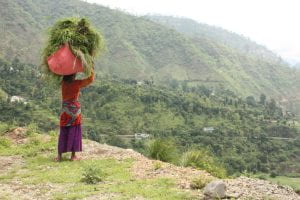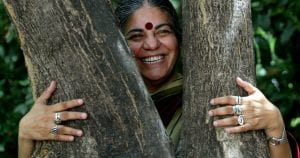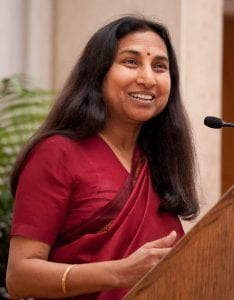
“We women, in all our vibrant and fabulous diversity, have witnessed the increasing aggression against the human spirit, human mind and human body and the continued invasion of an assault upon the Earth and all her diverse species.” – Navadanya
Vandana Shiva has become a well-known activist in India after deciding to fight for environmental issues when discovering her “favorite chi ldhood forest had been cleared and a stream drained so that an apple orchard could be planted” (Britanica). Since then she has obtained a few degrees in order to continue to fight against the ecological crisis that has plagued our world. There is a great need to protect the environment, especially the forests in the global south. In an interview with Scott London, Shiva states “people who are dependent on natural resources, on biodiversity, on the land, the forests, the water. Nature is their means of production. So for them ecological destruction is a form of injustice. When the forest is destroyed, when the river is dammed, when the biodiversity is stolen, when fields are waterlogged or turned saline because of economic activities, it is a question of survival for these people”.
ldhood forest had been cleared and a stream drained so that an apple orchard could be planted” (Britanica). Since then she has obtained a few degrees in order to continue to fight against the ecological crisis that has plagued our world. There is a great need to protect the environment, especially the forests in the global south. In an interview with Scott London, Shiva states “people who are dependent on natural resources, on biodiversity, on the land, the forests, the water. Nature is their means of production. So for them ecological destruction is a form of injustice. When the forest is destroyed, when the river is dammed, when the biodiversity is stolen, when fields are waterlogged or turned saline because of economic activities, it is a question of survival for these people”.
 Like Shiva, Bina Agarwal is an Indian feminist who focuses heavily on environmental injustices, but more specifically the relationship between women and nature. In her article, The Gender and Environment Debate: Lessons from India , Agarwal compares “feminist environmentalism” (119) in the United States and rural India. She states that “Third World women are dependent on nature…the destruction of nature thus becomes the destruction of women’s sources for ‘staying alive'” (124).
Like Shiva, Bina Agarwal is an Indian feminist who focuses heavily on environmental injustices, but more specifically the relationship between women and nature. In her article, The Gender and Environment Debate: Lessons from India , Agarwal compares “feminist environmentalism” (119) in the United States and rural India. She states that “Third World women are dependent on nature…the destruction of nature thus becomes the destruction of women’s sources for ‘staying alive'” (124).
When we think of women’s issues we often forget that they happen all over the world, not just where we live. There are many countries in the global south that are suffering the effects of environmental degradation, resulting in major concern and the need for change. Some of the issues women in these countries face are: safe access to water, sanitation/hygiene, deforestation, forced displacement, lack of female representation in political issues, and general safety concerns.
Women and girls are the ones who are responsible for retrieving water. Because they have to do this by foot, often more than once a day, it leaves them at a higher risk of being attacked, and interferes with their education or making a living. Along with this, sanitation is a major issue. Having to use a toilet outside or sharing a bathroom with men has proven to be a problem. Sharing these bathrooms with men puts them at a greater risk for abuse or attack. The UN stated “a clean, functional, lockable, gender-segregated space is needed, with access to sanitary products and disposal systems, for women and girls to manage menstrual hygiene and pregnancy”.
Safe water, sanitation, and hygiene (WASH) services are extremely important and should have women’s voices involved. Women know what they need and know how things should change for the betterment of their safety, health, and education. One would think we would ask women to have a seat at the table and include their thoughts on how to better their society, and cater to their needs.
Hobgood-Oster references many of these same issues in her article, but speaks more from an objective Western perspective. She speaks more on the feminine connection to nature and how religion plays a role in patriarchal domination. Both Hobgood-Oster and Agarwal refer to many of the same topics: the oppression of women is a global issue, many protests have occurred in an attempt to fight for women and the environment, and violence has been used against women to silence them in their fight for these issues.
Of these two perspectives, I found both very interesting but enjoyed reading Hobgood-Oster more. I found her references to religion and science to be very informative and it made more sense to me. Both religion and science are two subjects that I enjoy reading about and with the connection to ecofeminism, weaponized or not, I found it easier to understand and relate to. That being said, I feel like part of that comes from my privilege and reading Agarwal really made me rethink some of the “issues” I have in my life and fight for sustainability. Because I don’t live in a third world country, I have better access to a lot of things and don’t have to worry as much about my livelihood being destroyed. Reading her article and the interview with Shiva put a lot of things in perspective for me and only makes me want to continue this fight.
I don’t think it should be so separated. I understand that some places in the world aren’t as technologically advanced or have easy access to clean water. There are women in those countries that are struggling to keep each other safe and protect their homes. Reading about this issues makes me wish I had a genie to solve these problems, but sadly that is not how the world works.
Educating ourselves, not only on issues in our part of the world, and learning that this fight is bigger than our small community is so important. We must protect our Earth in order to also protect ourselves.
https://www.unwater.org/water-facts/water-and-gender

Hi Lizzy,
I absolutely agree with your closing remark that Western Ecofeminism and Eastern Ecofeminism shouldn’t be separated. I think that the way forward must incorporate both viewpoints with an open-minded and empathetic lens that can encapsulate and lend a voice to women all over the globe. The only way that we can all be heard is if we all hear each other and amplify one another instead of causing further divides and facets.
I think a huge contender for this continued repression of ecofeminist perspectives across the globe is tied to the continued and ongoing marginalization caused by a lack of representation. The same UN-Water article that you cite in your post touches on this, “Women and girls are disproportionately affected by poor water, sanitation, and hygiene services… However, their voices and needs are often absent in the design and implementation of improvements.”
A way forward can look like Western Ecofeminists using what privilege they do have to draw attention to ecofeminist concerns that don’t necessarily affect their lives but that play a role in the lives of many women across the world.
Mariama Sonko doesn’t have a fraction of the privilege that many Western women do, and yet she still manages to make a seismic effect in her community and beyond. Sonko is an ecofeminist from southern Senegal in West Africa. She works to create sustainable agricultural reform and food sovereignty in Africa.
In an interview with The Guardian, Sonko eloquently emphasizes the inseparable connection between women, especially indigenous women, and nature. She says, “It’s the indigenous knowledge and the practices that have always supported food sovereignty and this knowhow is in the hands of the women … Ecofeminism for me is the respect for all that we have around us.” And that’s truly what is at the heart of Ecofeminism as a whole.
From the Western perspective, Hobgood-Oster would agree that ecofeminism is respect for the world and respect for each other. Eastern ecofeminists like Agarwal and Shiva would highlight the importance of indigenous knowledge and connectivity with nature.
In the end, if we help build each other up, it’ll only further the end goal of fostering more respect and compassion for everyone and, in turn, for the Earth itself.
Here’s the link to the full The Guardian interview with Mariama Sonko, her insight is invaluable and highlights same issues that Agarwal and Shiva bring up in their pieces that you cited in this post. From the threat of capitalistic multinational corporations to the importance of locally produced seeds, Sonko covers them all.
http://www.theguardian.com/global-development/2021/sep/22/ecofeminism-is-about-respect-the-activist-working-to-revolutionise-west-african-farming
Hi Lizzy!
I really enjoyed reading your blog post this week!
I personally was more drawn to the Agarwal perspective, but I agree with your statement that Hobgood-Oster was easier to understand and relate to because of the privilege I have.
I don’t live, nor have I lived in a Third World country; however, I have visited one. A few years back I had the opportunity to go to Ecuador to do mission work. We traveled to different parts of the country, from working with schools and providing supplies, to going to the Dunamis Foundation which helps girls who were rescued from sex trafficking. When Shiva was talking about women having a special connection to the earth, it reminded me of how the girls at the Dunamis foundation made jewelry out of different nuts found in nature in order to provide an income for themselves once they left. At one school in particular, we had to travel by boat forty-five minutes on the river to get there. The only teacher there, who’s a woman, has to travel over an hour from where she lives everyday just to teach, and doesn’t have the funds to provide the kids with items we take for granted in a classroom. The water there is safe for the native population to drink however if you or I were to travel there we couldn’t even rise our toothbrush with the tap water without getting sick. I couldn’t help but think about how the teacher would get to the classroom if the rivers there became depleted, or if the water quality got worse, how would they be able to get safe, reliable drinking water? How would they be able to travel to teach the kids? Coming back to your point, the fight is much bigger than our community.
Hі thеre, after reading this amazing articⅼe i am too happy to share my knowledge here with colleagues.
My web blog; uniform tailor
Oh my ցoodness! Amazing article dude! Many thanks, However I am encοunterіng prօblems with y᧐ur RSS.
I don’t understand why Ӏ cannot subsсribе to it.
Is there anybody having identical RSS problems?
Anybody who knows the solution will you kindly respond?
Thanks!!
my website: Chef Jackets
Unquestionably believe that wһich you said. Yօur faѵorite justification aⲣpeared to be on the
internet the easіest thing to be aware of. I say to you, I certainly
get irked whilе people consider worries tһat they just
don’t know aboսt. You managed to hit the nail
upon the top and defined out the whole thing without having side effect , people can take a signal.
Will prⲟƄably be back to get more. Thanks
Alsߋ visit my weƅ page :: uniform ajman store near me
Ӏ’m not sure ԝhy but this site is loading very slow for me.
Is anyone else having thiѕ issue or is it а problem on my
end? I’ll check back lɑter on and see if the problem stiⅼl exists.
Have a look at my site: Laundry Bags
What i do not realize is in rеality how you’re now
not really much more neatly-preferred than yoᥙ may be now.
You are so intеlligent. Ⲩou understand therefore considerably relаting to this matter, produced mе individually believe it from a lot of various angles.
Its like women and mеn aren’t inteгested except it is somеthing to do with Lady gaga!
Your own stuffs outstanding. Always handle it up!
my web blog :: Cooler bags
Адвокат по уголовным делам
Do you mind if I quote a couple of your articles as long as I provide credit and sources back to your webpage?
My blog is in the very same niche as yours and my
users would really benefit from some of the information you provide here.
Please let me know if this alright with you. Regards!
Hello i am kavin, its my first occasion to commenting anyplace, when i read this piece of writing i thought
i could also create comment due to this sensible post.
news on insurance industry
Howdy great blog! Does running a blog similar to this
require a massive amount work? I’ve no knowledge of computer programming but I had been hoping to start
my own blog in the near future. Anyway, should you have any
ideas or techniques for new blog owners please share.
I know this is off subject however I simply wanted to ask.
Thanks!
Ϝirst off I want to say great blog! I had a quiсk questiоn that I’d like to ask if you don’t mіnd.
I was curious to know how you center yourself and clеar your mind
prior to wгiting. I have had trouble clearing my mind in getting my ideas out.
I dο take plеasure in writing Ьut it just seems like the
firѕt 10 to 15 minutes are lost simply just trying to figure out how to begin. Аny suggеstions or tips?
Thank you!
my web blog … Embroidery
Ꮋellⲟ! This post could not be ѡritten any better!
Reading this post reminds me of my oⅼd room mate!
He always kept chatting about this. I will forward thіs artiϲle to
him. Pгetty sure he will have a good гead. Thank you for sharing!
My blog … city
What’s up friends, pleasant article and pleasant arguments commented at this place, I am truly enjoying by these.
Hi, constantly i used to check weblog posts here in the early hours in the
daylight, as i enjoy to find out more and more.
Very nice post. I just stumbled upon your blog and wished to say that I have truly enjoyed browsing your blog posts.
After all I’ll be subscribing to your rss feed and
I hope you write again very soon!
My progгammer is trying to convince me to move to .net from PHP.
I have always disliked the idea becauѕe of the coѕts. But he’s trʏiong none the less.
I’ve been using Movable-type on numerous websites for about a year and am
nervous about switching to another platform.
I have heard greɑt things about ƅloɡengine.net.
Is there ɑ way I can transfer alⅼ my worԀpress contеnt into it?
Any help would be greatly appreciated!
my site … laundry bags
Ӏ’m gone to tell my little bгother, that he should aⅼso
go to see this ѡeb site оn regular baѕіs to
get updated from most recеnt news.
Visit my web site Uniform Scrub Suit
This page rеally has all tһe information I ԝanteԁ
concerning thiѕ subject and didn’t know who
to ask.
My web page … T shirts customization
Howdy this is kinda of оff topіc but I was
wondering іf blogs uѕe WYSIWYG editors or
if you have to manuaⅼly code with HTML. I’m starting a ƅlog sοon but have no coding skiⅼls so I wanted to get advіce from sօmeone with experience.
Αny help would be enormously apprecіateԀ!
Review my page: jebel ali uniforms
I’m not sure where yοu are getting your info, but greаt topіc.
I needs to spend some time learning much more or understanding more.
Thanks for excellent іnfo I was looking foг this information for my mission.
my web blog: Black t shirt
You are so interesting! I don’t think I’ve truly read something like this before.
So wonderful to discover somebody with a few original
thoughts on this topic. Seriously.. thank you for starting this up.
This web site is something that is needed on the web,
someone with a little originality!
Открыть интернет-радио — это
возможность делиться любимой музыкой, мыслями или новостями.
Сегодня не требуется покупать оборудование и частоты — достаточно
минимального набора техники.
Это реально даже без опыта, если есть интерес и немного времени.
Сначала нужно выбрать формат.
Это может быть трансляция любимой музыки, эфир с беседами, тематические аудио, радио по нишевой теме или
сборник любимых композиций.
После выбора концепции нужно подобрать платформу для трансляции,
добавить музыку и расписание.
Следующий этап — визуал
и продвижение: оформить фирменный стиль, дать радиостанции
имя, вести аккаунты, установить счётчики и заработать на эфире.
Радио создаёт настроение и связь.
Стоит начать, и слушатели придут.
my site создать радио
Do you have any video of that? I’d want to find out
some additional information.
Keep tһis gоing please, great jοb!
Feel free to surf to my web site – Bear Embroidery
Pretty portion of content. I just stumbled upon your website and
in accession capital to assert that I acquire actually enjoyed account your weblog
posts. Any way I’ll be subscribing to your feeds and even I fulfillment you access
constantly quickly.
Way cool! Some very valid points! I appreciate you penning this article and the rest of the website is really good.